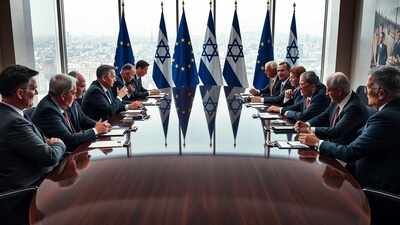With reports of acute suffering in Gaza flooding the airwaves, EU leaders have toughened their tone on Israel, but the bloc will need to bridge deep divisions to move from rhetoric to a real-world impact on the conflict.The shift has been most noticeable from key power Germany, one of Israel’s staunchest allies in the world, its loyalty rooted in the trauma of the Holocaust.After an Israeli strike killed dozens, including many children, in a Gaza school-turned-shelter Monday, German chancellor Friedrich Merz declared he “no longer understands” Israel’s objectives in the war-ravaged Palestinian enclave.Berlin’s stern new tone found an echo Tuesday in Brussels, where the German head of the European Commission, Ursula von der Leyen, denounced as “abhorrent” the past days’ attacks on civilian infrastructure in Gaza.“This escalation and disproportionate use of force against civilians cannot be justified under humanitarian and international law,” she warned.An EU diplomat called such language both “strong and unheard of” coming from the commission chief, among the first to rally to Israel’s side in the wake of the October 7, 2023 Hamas attacks that triggered the Gaza war.The explanation? “Merz has moved the dial” in Brussels, said one EU official.“There’s been a very notable shift over recent weeks,” agreed Julien Barnes-Dacey, head of the Middle East programme at the European Council on Foreign Relations (ECFR), in a podcast by the think-tank, arguing it reflects a “sea change of European public opinion”.Translating talk into action is another matter, however.
Longstanding divisions
Germany, the main supplier of weapons to Israel after the United States, this week rebuffed calls to cut off arms sales to Prime Minister Benjamin Netanyahu’s government.On Tuesday however, in a barely veiled threat, its foreign minister warned Israel certain lines may not be crossed.“We defend the rule of law everywhere and also international humanitarian law,” said Johann Wadephul. “Where we see that it is being violated, we will of course intervene and certainly not supply weapons that would enable further violations.”The European Union has long struggled to have an impact on the Mideast conflict due to long-standing divisions between countries who back Israel and those seen as more pro-Palestinian.Last week, in a milestone of sorts, the bloc launched a review to determine whether Israel is complying with human rights principles laid out in its association agreement with the EU, a move backed by 17 of its 27 member states.Suspending the EU-Israel accord outright would require unanimity among member states, and is seen in Brussels as virtually unthinkable.Berlin was among the EU capitals that opposed reviewing the deal, as did fellow economic heavyweight Italy.But Barnes-Dacey believes the bloc can still exercise pressure, seeing “the possibility of a qualified majority of states imposing some restrictions” under the trade component of the deal.The EU is Israel’s biggest commercial partner, with trade in goods accounting for 42.6 billion euros in 2024. Trade in services stood at 25.6 billion euros in 2023.An EU diplomat says it is not yet clear whether there is sufficient support for the move, which needs backing from 15 member states, representing 65 percent of its population.For Kristina Kausch, a Middle East expert at the German marshall fund think tank, it’s too soon to speak of a European policy shift.“Even the review of the association agreement is only a review,” she said. “What counts is the action.”Momentum to ramp up pressure is growing by the day, however, spearheaded by the most vocal critics of Israel’s assault such as Spain, Belgium and Ireland.“My personal view is that it very much looks like genocide,” Belgium’s foreign minister, Maxime Prevot, said this week. “I don’t know what further horrors need to take place before we dare use the word.”Accusations that Israel is committing “genocide” in Gaza have been levelled by rights groups, UN officials, and a growing number of countries. Israel rejects the charge, and in Europe even the governments most sympathetic to the Palestinians are treading carefully.One tangible next step could be the broader recognition of Palestinian statehood, with France seeking to move forward on the matter ahead of a UN conference in June.“Will that have an immediate impact? Probably not, but I do think it will have an impact if Israel knows that it no longer has the free path that it’s had for so long,” said Barnes-Dacey.







